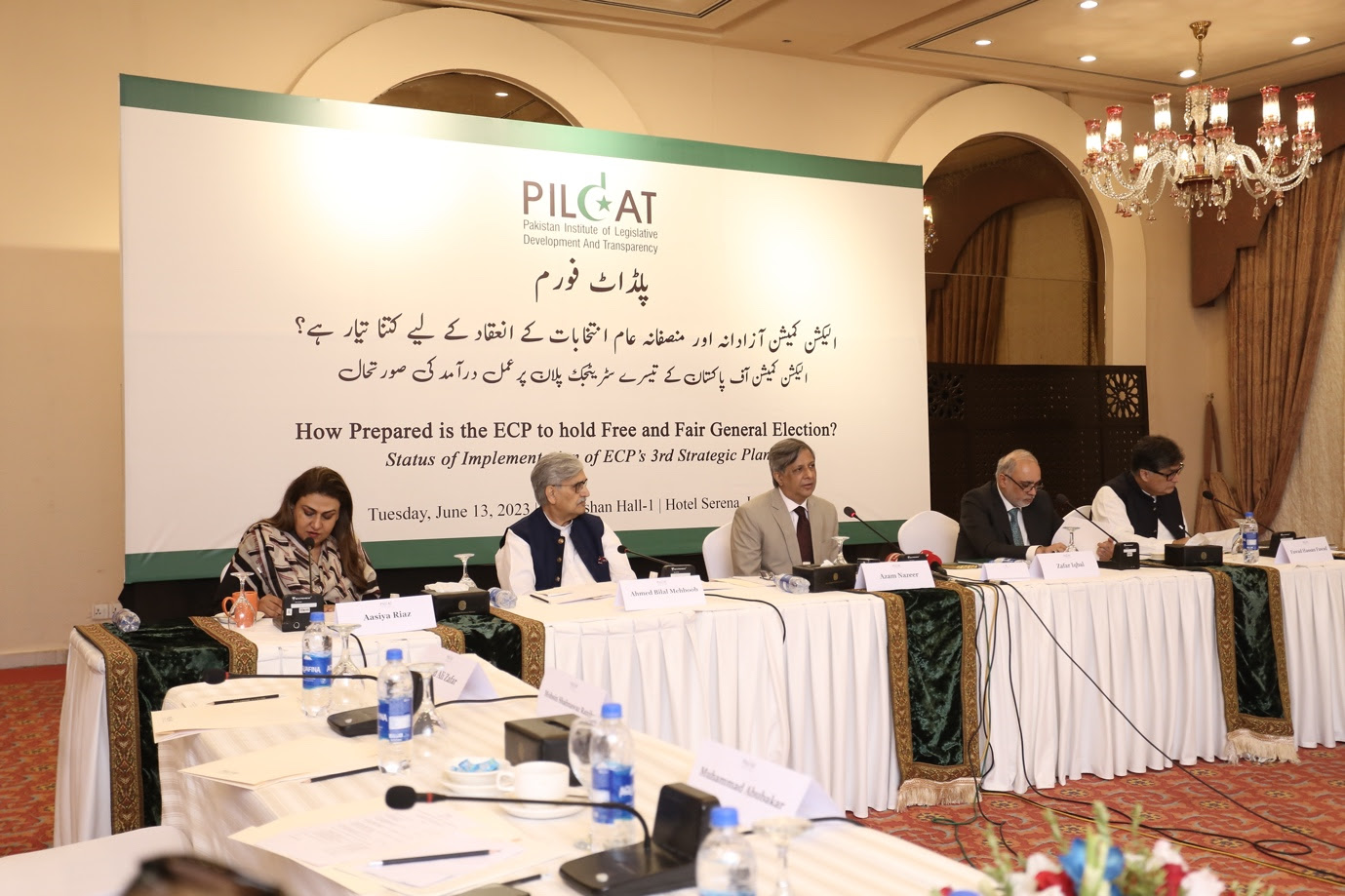STAFF REPORTER
ISLAMABAD: During the PILDAT Forum, the Election Commission of Pakistan (ECP) announced that it had achieved 90% implementation of its Strategic Plan. This milestone indicated the ECP’s preparedness to hold free and fair general elections in 2023. Senator Azam Nazeer Tarar, representing the Federal Government, emphasized the government’s commitment to fulfilling its term and that of the National Assembly in accordance with the Constitution and the law, with the conclusion expected in August.
The PILDAT Forum served as a platform to discuss Pakistan’s readiness for the upcoming Free and Fair General Election in 2023. Distinguished speakers at the event included Senator Azam Nazeer Tarar, Federal Minister for Law and Justice; Mr. Zafar Iqbal, Special Secretary of the ECP; Mr. Fawad Hasan Fawad, former Special Secretary to the Prime Minister; Senator Syed Ali Zafar of the PTI; Mr. Mohsin Shahnawaz Ranjha, MNA-PML-N; Senator Taj Haider, PPPP; Senator Kamran Murtaza, MMAP; and Mr. Muhammad Abubakar, MNA MQMP.
Mr. Zafar Iqbal, the Special Secretary of the ECP, provided a comprehensive update on the progress made towards the ECP’s third strategic plan (2019-2023). He expressed confidence in the ECP’s readiness to conduct a free and fair general election, highlighting the commission’s commitment to its vital role in the democratic process. Mr. Iqbal’s statement underscored the ECP’s dedication to ensuring a credible electoral process through their tireless efforts. The strategic plan has served as a roadmap for the ECP’s operations, and the update presented at the forum indicated promising prospects for the upcoming elections, demonstrating professionalism and integrity. Mr. Iqbal also emphasized the importance of instilling societal belief in the democratic process and discussed the ECP’s endeavors to create a conducive environment for the election.
Senator Azam Nazeer Tarar, the Federal Minister for Law and Justice, presented the government’s perspective on the upcoming general election, outlining key elements of the Elections Act 2017. He emphasized the Election Commission of Pakistan’s authority in determining the election date and acknowledged the financial constraints the ECP had faced in the past year. However, he reassured the audience that the ECP had become a strengthened institution, no longer constrained by financial limitations. Senator Tarar affirmed the government’s commitment to complete its tenure within the constitutional framework, along with the National Assembly. He commended the ECP’s proactive approach in ensuring free and fair elections.
Mr. Fawad Hasan Fawad, former Principal Secretary to the Prime Minister of Pakistan, stressed the importance of support and cooperation from the entire democratic society, citizens, and political parties to fulfill the ECP’s constitutional responsibility of holding free, fair, and credible elections. He highlighted the significance of census data in the election process, particularly for constituency delimitation and representation. Mr. Hasan emphasized the need for increased openness and engagement throughout the census process to address the difficulties faced by smaller provinces. He also emphasized the importance of a well-defined election plan, precise voter registration, and accurate vote counting. Mr. Hasan acknowledged the ECP’s progress over the years and emphasized the need to manage expectations and develop confidence by effectively communicating the capabilities and limitations of the ECP and the electoral process.
Mr. Ahmed Bilal Mehboob, President of PILDAT, provided an overview of the implementation status of the ECP’s third strategic plan (2019-2023). He highlighted the ECP’s consistent efforts to improve its processes over the past 15 years and the government’s role in facilitating the ECP’s work and its impact on the electoral process. He commended the ECP’s noteworthy dedication to strategic planning, which has allowed them to refine their procedures and adapt to changing conditions. The regular evaluations, revisions, and new strategic plans demonstrate the ECP’s commitment to continuous progress and responsiveness to the evolving demands of the electoral environment. Mr. Mehboob emphasized that successful execution of the strategic plan requires collaboration with diverse stakeholders, including political parties, civil society, the media, and voters themselves.
The PILDAT Forum brought together leading figures from the development sector, civil society, media, academia, and youth, creating an important space for dialogue, mutual understanding, and collaboration. Thoughtful discussions were held on various aspects of the upcoming elections, including the ongoing census and its potential influence on the electoral process, the ECP’s plans for managing logistical aspects, and the ECP’s evolution over time in meeting the expectations of Pakistani society.
Senator Syed Ali Zafar of the PTI emphasized in his comments that the General Election must be held by October 2023 at the latest, highlighting the ECP’s critical role in safeguarding the democratic process. He expressed surprise at the idea of a commission refusing to hold elections, underscoring the ECP’s constitutional obligation in this regard. Senator Zafar referred to a recent case involving the dissolution of the Punjab and Khyber Pakhtunkhwa assemblies, raising reservations about the ECP’s position and expecting more decisive action aligned with their constitutional responsibilities. Such exchanges and honest discussions are crucial for the ongoing development of Pakistan’s election system.
Moderated by Ms. Aasiya Riaz, Joint Director of PILDAT, the forum reaffirmed the collective commitment to upholding democracy in Pakistan, with the critical role of the ECP in ensuring free and fair elections being recognized and appreciated. It emphasized the importance of open dialogue, stakeholder engagement, and continuous improvement in the pursuit of democratic values.














